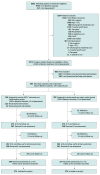Nurse Telephone Support for Caregivers of Older Adults at Hospital Discharge: A Randomized Clinical Trial
- PMID: 39453654
- PMCID: PMC11581515
- DOI: 10.1001/jamanetworkopen.2024.41019
Nurse Telephone Support for Caregivers of Older Adults at Hospital Discharge: A Randomized Clinical Trial
Abstract
Importance: Informal caregivers who provide home-based care frequently experience stress and burden that adversely affect their health-related quality of life (HRQOL).
Objective: To evaluate the efficacy of the Further Enabling Care at Home (FECH+) program for the HRQOL of caregivers of older adults discharged home from the hospital.
Design, setting, and participants: This multicenter, parallel, 2-group randomized clinical trial, with blinded baseline and outcome measurements, was conducted at 3 hospitals in 2 states in Australia. Recruitment took place between August 2020 and July 2022, and follow-up was performed for 12 months after hospital discharge. Participants were dyads of caregivers and patients. Eligible caregivers were aged 18 years or older who provided informal home-based care at least weekly for a patient aged 70 years or older. Caregivers were enrolled when their patient was discharged from the hospital. Dyads were randomly assigned to either the intervention or control group. Data analysis followed an intention-to-treat approach.
Intervention: Caregivers in the intervention group received the FECH+ program, structured nurse support of 6 telephone calls over 6 months after the patient's discharge plus usual discharge care. Caregivers in the control group received usual care alone.
Main outcomes and measures: Primary outcome was caregivers' HRQOL 6 months after discharge, which was measured using the Assessment of Quality of Life 8-Dimension (AQOL-8D). Secondary outcomes were caregivers' HRQOL 12 months after discharge as well as preparedness to care (measured using the Preparedness for Caregiving Scale), self-efficacy (measured using the Caregiver Inventory), and levels of strain and distress (measured using the Family Appraisal of Caregiving Questionnaire) at 6 and 12 months after discharge. Baseline and outcome measurements were administered by telephone at 3, 6, and 12 months after discharge.
Results: A total of 547 dyads (caregivers: 405 females [74.0%], mean [SD] age, 64.50 [12.82] years; patients: 296 females [54.1%], mean [SD] age, 83.16 [7.04] years for the intervention group and 83.45 [7.20] years for the control group) were included in the intention-to-treat analysis. There was no significant difference in caregivers' HRQOL between the 2 groups at the primary time point of 6 months (difference in AQOL-8D score, 0.01; 95% CI, -0.02 to 0.03; P = .62) after hospital discharge.
Conclusions and relevance: In this randomized clinical trial, the FECH+ program-a nurse telephone support intervention for caregivers of older adults after hospital discharge-did not significantly improve caregivers' HRQOL at 6 months after discharge compared with usual care. Additional examination is warranted into improving caregivers' HRQOL at the time of their patient's hospital discharge.
Trial registration: Australian New Zealand Clinical Trials Registry Identifier: ACTRN12620000060943.
Conflict of interest statement
Figures


References
-
- 2020. Report: caregiving in the US. National Alliance for Caregiving ; AARP. Accessed March 30, 2024. https://www.caregiving.org/wp-content/uploads/2021/01/full-report-caregi...
-
- Petrillo M, Bennet M. Valuing carers 2021: England and Wales. Accessed March 30, 2024. https://www.carersuk.org/reports/valuing-carers-research-report/
-
- Schirmer J, Mylek M, Miranti R. Caring for Others and Yourself. Canberra, ACT: Carer’s Australia and University of Canberra; 2022. Accessed March 30, 2024. https://www.carersaustralia.com.au/wp-content/uploads/2021/10/211011_Car...
-
- Reinhard SC, Caldera S, Houser A, Choula RB. Valuing the invaluable: 2023. update: strengthening supports for family caregivers. Accessed March 30, 2024. https://www.aarp.org/content/dam/aarp/ppi/2023/3/valuing-the-invaluable-...
Publication types
MeSH terms
LinkOut - more resources
Full Text Sources
Medical

